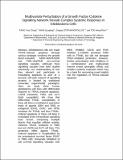Multivariate Perturbation of a Growth Factor-Cytokine Signalling Network Reveals Complex Systemic Responses in Glioblastoma Cells
Author(s)
Tang, Yew Chung; Wan, Guoqiang; Stephanopoulos, Gregory; Too, Heng-Phon
DownloadCPE005.pdf (11.07Kb)
Metadata
Show full item recordAbstract
Glioblastoma cells can evade TRAIL-induced apoptosis through various strategies involving the growth factor-activated MEK–MAPK/ERK and PI3K–Akt/PKB pro-survival signalling cascades. Although these signalling cascades have been studied extensively, our understanding of how they interact and participate in modulating apoptosis as part of a dynamic cell-wide network of signalling proteins is limited by traditional univariate experimental paradigms. Here, we study three human glioblastoma cell lines with differential response to TRAIL-induced apoptosis: LN229 (resistant), T98G, and A172 (both susceptible). We show that differential TRAIL susceptibility in these cell lines is unrelated to expression levels of agonist (DR4 and DR5) or antagonist (DcR1, DcR2, and OPG) receptors for TRAIL and thus TRAIL-induced apoptosis in these cell lines is modulated at the intracellular signalling level. Serum, comprising multiple factors that regulate cellular activity, enhances TRAIL resistance in T98G but not LN229 and A172 cell lines. This protective effect against TRAIL-induced apoptosis is recapitulated by the prototypical survival factor PDGF in T98G cells. Univariate inhibition of cell survival signalling cascades with MEK inhibitor U0126 and PI3K inhibitor LY294002 sensitized T98G cells to TRAIL but did not abrogate PDGF-mediated protection. However, further perturbation with inhibitors in a combinatorial and multivariate manner reveal synergistic effects and complex systemic responses which may be a basis for uncovering novel insights into the regulation of TRAIL-induced apoptosis.
Date issued
2007-01Series/Report no.
Chemical and Pharmaceutical Engineering (CPE)
Keywords
Signal Transduction, Network Biology, Apoptosis, Kinase Inhibitors